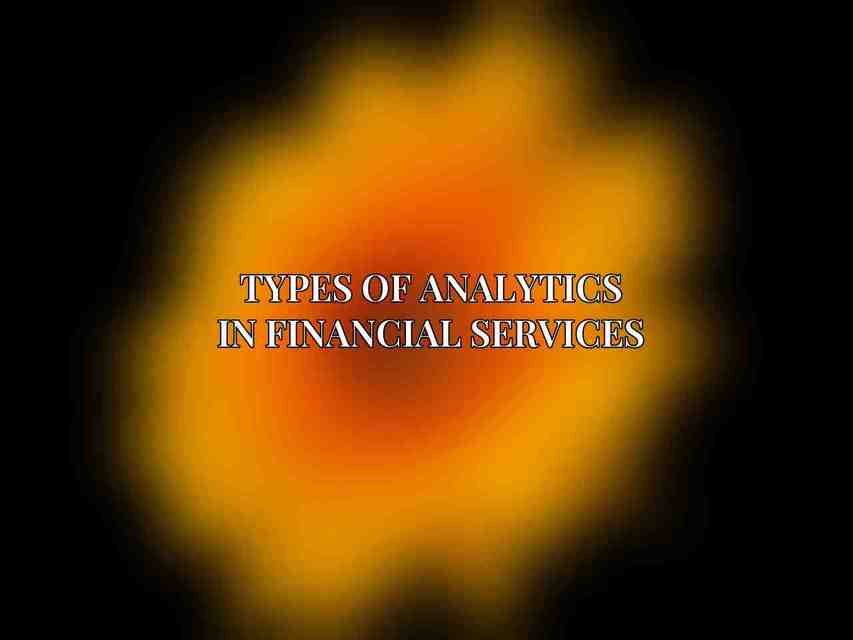The finance industry has witnessed a significant transformation in recent years with the rise of financial analytics. This evolution has been fueled by the increasing availability of data and the advancements in technology that allow for the processing and analysis of vast amounts of financial information. Financial analytics refers to the use of data analytics and data science techniques to extract insights, make informed decisions, and drive strategic actions in the finance sector.
The Rise of Financial Analytics

The rise of financial analytics can be attributed to the growing need for data-driven decision-making processes within financial institutions. This shift is driven by the realization that traditional methods of analysis are no longer sufficient in a rapidly changing and competitive environment. By leveraging data analytics, organizations can gain a deeper understanding of market trends, customer behaviors, and operational efficiency.
Benefits of Analytics in the Finance Industry
The adoption of financial analytics offers a multitude of benefits to the finance industry. Some of the key advantages include improved risk management, enhanced customer personalization, better investment insights, and overall operational efficiency. By harnessing the power of data analytics, financial institutions can optimize processes, reduce costs, and increase profitability.
Types of Analytics in Financial Services

different types of analytics are employed to address specific challenges and opportunities. These include descriptive analytics for historical data analysis, predictive analytics for forecasting future trends, and prescriptive analytics for recommending optimal actions. Each of these analytical approaches plays a crucial role in helping financial institutions make informed decisions.
Case Studies of Financial Analytics in Action
Financial analytics has been instrumental in transforming various aspects of the finance industry. Let’s explore some compelling case studies that showcase the practical applications of analytics in different areas.
Risk Management
Risk Modeling at JPMorgan Chase
JPMorgan Chase, a leading global financial services firm, has embraced financial analytics to enhance its risk management practices. By implementing sophisticated risk modeling techniques, the company can assess and mitigate potential risks more effectively, ensuring the stability of its operations.
Fraud Detection at Citibank
Citibank has leveraged analytics to strengthen its fraud detection capabilities. Through the use of advanced algorithms and machine learning, Citibank can identify suspicious activities and fraudulent transactions in real-time, safeguarding its customers from financial fraud.
Stress Testing at Goldman Sachs
Goldman Sachs utilizes financial analytics for stress testing scenarios to evaluate the resilience of its financial strategies under adverse economic conditions. This proactive approach enables the firm to identify vulnerabilities and implement risk mitigation measures promptly.
Customer Personalization
Customer Segmentation at Wells Fargo
Wells Fargo employs analytics for customer segmentation to better understand the diverse needs and preferences of its client base. By categorizing customers into distinct segments based on behavior and demographics, the bank can tailor its services and offerings to enhance customer satisfaction.
Cross-Selling at Bank of America
Bank of America utilizes financial analytics to drive cross-selling initiatives by analyzing customer data to identify opportunities for promoting additional products or services. This targeted approach enhances customer engagement and contributes to revenue growth for the bank.
Personalized Marketing at Capital One
Capital One leverages analytics for personalized marketing campaigns that resonate with individual customers on a deeper level. By analyzing customer interactions and preferences, Capital One delivers tailored marketing messages that drive customer acquisition and retention.
Investment Insights
Predictive Modeling at BlackRock
BlackRock, a prominent asset management firm, harnesses the power of predictive modeling to forecast market trends and make informed investment decisions. By analyzing historical data and market indicators, BlackRock can optimize its investment strategies for better returns.
Portfolio Optimization at Vanguard
Vanguard utilizes analytics for portfolio optimization, seeking to maximize returns while managing risks for its clients. By applying sophisticated algorithms and data analysis techniques, Vanguard constructs well-balanced portfolios that align with investors’ objectives and risk profiles.
Hedge Fund Analysis at Two Sigma
Two Sigma, a quantitative hedge fund, relies on advanced financial analytics for in-depth analysis of market data and trends. By leveraging cutting-edge technology and data science methodologies, Two Sigma seeks to gain a competitive edge in the dynamic world of hedge fund investments.
Technologies and Tools for Financial Data Analytics
The successful implementation of financial analytics relies on the utilization of various advanced technologies and tools that enable efficient data processing, analysis, and interpretation.
Artificial Intelligence (AI)
AI plays a pivotal role in financial data analytics, offering a range of capabilities that enhance decision-making processes within the finance industry.
- Machine Learning for Risk Assessment: Machine learning algorithms are utilized to assess risks associated with financial transactions and investments, enabling institutions to make data-driven decisions.
- Deep Learning for Fraud Detection: Deep learning models can accurately identify patterns of fraudulent behavior and anomalies in financial transactions, strengthening fraud detection mechanisms.
- Natural Language Processing for Customer Analysis: Natural language processing techniques are employed to analyze customer feedback, interactions, and sentiments, providing valuable insights for personalized services and targeted marketing strategies.
Big Data Technologies
financial institutions rely on advanced technologies to manage and analyze vast amounts of data efficiently.
- Hadoop for Data Storage: Hadoop is utilized for distributed storage and processing of large datasets, allowing financial organizations to store and access data seamlessly.
- Spark for Data Processing: Apache Spark enables high-speed data processing and analysis, supporting real-time decision-making and advanced analytics in a scalable environment.
- Kafka for Data Streaming: Apache Kafka facilitates real-time data streaming and processing, enabling financial institutions to capture and analyze streaming data for immediate insights and actions.
Cloud Computing
Cloud computing services have revolutionized financial analytics by providing scalable infrastructure and resources for data processing and analysis.
- AWS for Analytics Platform: Amazon Web Services (AWS) offers a robust platform for analytics that enables financial institutions to deploy scalable solutions for data processing, modeling, and visualization.
- Azure for Data Science Tools: Microsoft Azure provides a suite of data science tools and services that empower organizations to leverage advanced analytics for business insights and decision-making.
- Google Cloud for Machine Learning: Google Cloud Platform offers advanced machine learning capabilities that enable financial institutions to develop predictive models, automate processes, and drive innovation through data-driven solutions.
The Future of Financial Analytics
driven by emerging trends and advancements in technology.
Emerging Trends in Analytics
- Data-Driven Decision-Making: The emphasis on data-driven decision-making will continue to grow, with organizations relying on analytics to drive strategic initiatives and operational efficiency.
- Predictive Analytics for Risk Mitigation: Predictive analytics will play a key role in identifying and mitigating risks proactively, enabling financial institutions to anticipate challenges and adapt to changing market conditions.
- Personalization and Customer Engagement: Personalized services and tailored customer experiences will be a key focus for financial institutions, leveraging analytics to understand customer needs and preferences for enhanced engagement.
Talent and Skills required for Analytics
To harness the power of financial analytics, organizations need to cultivate a skilled workforce equipped with the necessary expertise in data science and analytics.
- Data Scientists: Data scientists play a critical role in analyzing data, building models, and extracting valuable insights to drive business decisions and strategies.
- Business Analysts: Business analysts bridge the gap between technical analytics and business objectives, translating data insights into actionable recommendations for organizational growth.
- Software Engineers: Software engineers develop and maintain the technological infrastructure that supports financial analytics, ensuring efficient data processing and analysis capabilities.
Key Takeaways and Best Practices
In navigating the complexities of financial analytics, organizations are advised to adhere to key principles and best practices to maximize the value of their analytical initiatives.
The Importance of Data Quality
Ensuring data quality and integrity is paramount in financial analytics, as inaccurate or incomplete data can lead to flawed analyses and decision-making. Organizations must establish robust data governance processes to maintain high data quality standards.
Ethical Considerations in Analytics
as privacy concerns and regulatory compliance requirements must be addressed. Organizations should prioritize ethical practices and transparency in data handling and analytics processes.
Measuring the Value of Analytics Initiatives
Measuring the value and impact of financial analytics initiatives is essential for assessing the return on investment and optimizing future strategies. Key performance indicators (KPIs) should be defined to track the outcomes and success of analytical projects.
The Continuous Evolution of Financial Analytics
As technology advances and market dynamics shift, the world of financial analytics will continue to evolve. Organizations must remain agile and adaptable, embracing innovation and staying abreast of emerging trends to maintain a competitive edge in the finance industry.
financial analytics is revolutionizing the finance industry by empowering organizations with actionable insights, improved decision-making capabilities, and strategic advantages. By leveraging advanced technologies, cultivating talent, and adhering to best practices, financial institutions can unlock the full potential of analytics to drive growth, mitigate risks, and enhance customer experiences in an increasingly data-driven world.
Frequently Asked Questions
What is financial analytics?
Financial analytics involves using data and quantitative methods to provide insights into financial markets and make informed decisions.
How is financial analytics transforming the finance industry?
Financial analytics is transforming the finance industry by enabling better risk management, improving decision-making processes, and identifying market trends more accurately.
What are the benefits of using financial analytics in finance?
Some benefits of using financial analytics in finance include improved forecasting accuracy, enhanced operational efficiency, better fraud detection, and increased profitability.
What types of data are analyzed in financial analytics?
Financial analytics typically involves analyzing various types of data, such as market data, operational data, customer data, and macroeconomic data.
How can companies implement financial analytics in their operations?
Companies can implement financial analytics by investing in advanced analytics tools, training their employees in data analytics techniques, and establishing data-driven decision-making processes.

